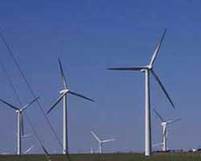Renewable energy choices
Clean energy may also be called renewable energy or green energy. It specifically refers to energy produced usually from renewable resources without creating environmental debt.
There are several other ways such clean energy can be defined. In some cases it may refer to energy processes that pollute less, or it can be considered energy that doesn't pollute at all and doesn't use non renewable resources.
The basic forms of clean energy are often cited as those that come from water, wind, or sun (solar). It's hoped that clean energy use, especially as a total substitution for use of things like oil, might help to reduce global warming and greenhouse gas emissions, creating a safer planet for all inhabitants.
|
|
Solar power
Solar power describes a number of methods of harnessing energy from the light of the sun. It is a versatile source of renewable energy that can be used in a vast number of applications, providing power for everything from cars and boats to houses and spacecraft. Solar power is also clean and pollution-free.?
|
|
Wind power
Wind power is an alternative source of electricity. This technology harnesses the power of the wind. The wind is one of the safest and cleanest sources of renewable energy. Wind power has three distinctive advantages. It is renewable, little water consuming and emission-free.?
|
|
Nuclear energy
Nuclear energy produces almost no pollution. It is a good alternative to fossil fuels as the world is striving to curb carbon dioxide emissions. But it consumes uranium fuel and produces nuclear waste. The development of nuclear energy also requires big investment.?
|
|
Geothermal power
Geothermal power is electricity generated using naturally occurring geological heat sources. It is a form of renewable energy.?
|
|
Tidal power
Tidal power is a means of electricity generation achieved by capturing the energy contained in moving water mass due to tides. Two types of tidal energy can be extracted: kinetic energy of currents due the tides and potential energy from the difference in height (or head) between high and low tides.
 |
Wave power
Wave power refers to the capture of ocean surface wave energy to do useful work including electricity generation, desalination, and filling a reservoir with water. Wave power generation is not a widely employed technology; there are only a few experimental sites in existence.
|
|
Hydro energy
Hydro energy is simply energy that is taken from water and converted into electricity. The most common method of converting energy from water is through a hydroelectric dam, where water runs into the dam causing turbines to rotate and the energy is captured to run a generator.
 |
Bioenergy
Bioenergy is stored energy from the sun contained in materials such as plant matter and animal waste, known as biomass. As biomass sources can be consistently replenished, for example by planting more trees, bioenergy is classed as renewable. Bioenergy can be used to generate electricity, produce heat, and also for the production of biofuels.
 0 Comments
0 Comments












